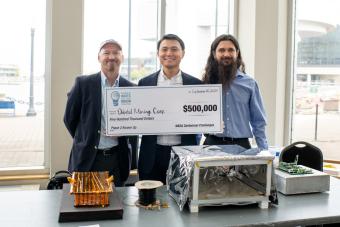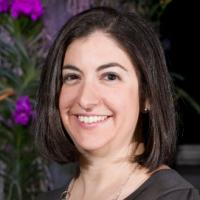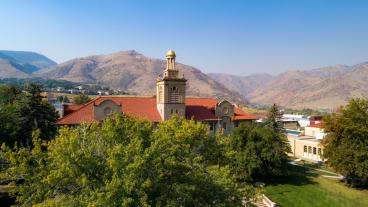Grad students win $500K in NASA’s Watts on the Moon Centennial Challenge

Orbital Mining Corporation’s leadership team with its lunar transmission and storage system. From left to right: Chris Tolton, CEO/co-founder; Ken Liang, CTO/co-founder; Raymundo Medina, chief technical adviser
Orbital Mining Corporation, an early-stage space mining startup started by two Mines graduate students, won $500,000 in NASA’s Watts on the Moon Challenge for its lunar power transmission and storage system.
Chris Tolton and Ken Liang, who are both pursuing Master of Science degrees in space resources, are the founders of Orbital Mining. Tolton serves as CEO, while Liang is CTO. Together, they created the solution to the NASA challenge that earned them this honor.
“We’re thrilled with our engineering team and the solution’s incredibly resilient performance,” Liang said. “Using only passive thermal techniques, the system maintained safe operating temperatures and provided uninterrupted power for the entire 48 hours in lunar night. No active heating, no mechanical actuation, no valves, no failures.”
The NASA challenge solicited “breakthrough power transmission and energy storage technologies that could enable long-duration Moon missions to advance the nation’s lunar exploration goals.” Orbital Mining’s solution was one of only two systems that successfully operated in the simulated lunar environment at NASA’s Glenn Research Center in Cleveland, Ohio. The solution provided uninterrupted, continuous power for 48 hours across a 3-km simulation in hard vacuum and cryogenically cold (-190°C) temperatures.
Orbital Mining developed the lunar power transmission and storage system, named “No Replacement for DC-Placement,” over the course of two years. The system includes high-voltage direct current cable transmission, ultra-high performance silicon carbide power electronics, a large lithium-ion battery bank and a passive thermal management solution.
During the final round of competition, four finalist teams refined their hardware and delivered a full system prototype for testing in lunar conditions. The test simulated a challenging lunar environment with two cycles of six hours of daylight and 18 hours of darkness, while the user is three kilometers from the power source. Orbital Mining was the runner-up to a team from the University of California Santa Barbara’s Space Research Laboratory. Between the two winning teams, this challenge initiated the first ever successful demonstrations of high-voltage power transmission in cryogenically cold vacuum in a NASA facility. Prior stages of the NASA Centennial Challenge granted $600K in addition to the final prize, resulting in total winnings of $1.1 million for Orbital Mining.
Orbital Mining is based in Golden, Colorado, with ambitions to “mine the Moon by the end of the decade.” The company is rapidly developing capabilities to design, manufacture and test equipment for both the lunar surface and terrestrial high-performance markets. From its founding two years ago, Orbital Mining has received $1.2 million in non-dilutive funding from NASA.
“The success of Orbital Mining Corporation is a result and perfect example of the multi-talented and strong entrepreneurial nature of our students in the interdisciplinary field of space resources,” said Angel Abbud-Madrid, professor of practice in mechanical engineering and director of the Center for Space Resources at Mines.
Orbital Mining came together when Tolton and Liang met through a shared class at Mines and decided to combine forces to create their startup. Mines’ entrepreneurial ecosystem, from the Innov8x class where the two first met to the varied support the team utilizes at the newly opened Beck Venture Center, helped launch Orbital Mining, and the company continues to be supported by resources at the university.
“As one of the founding members of the Beck Venture Center, Orbital Mining Corporation is a shining example of what is possible for student and alumni entrepreneurs here at Mines,” Zack Bennett, director of the Beck Venture Center. “We are proud that we have been able to support their success, and we are excited to see how they inspire even more Mines students to build amazing companies that literally shoot for the Moon.”
What’s next for Orbital Mining? Tolton and Liang have their sights set high – the sky is not the limit.
“We want to power the Moon to enable the new space economy,” Liang said.




